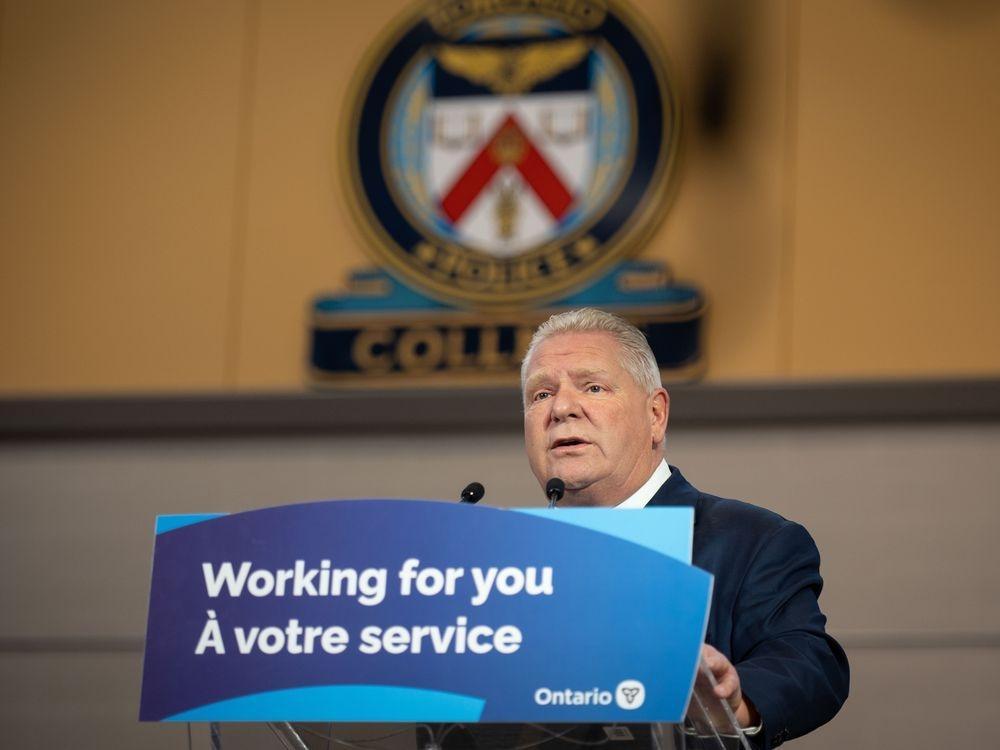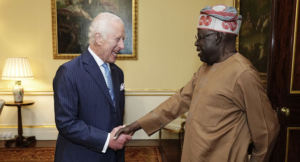
Ontario will forge new “bail compliance teams” in its latest effort to tackle violent crime, Premier Doug Ford said Thursday.
The province is investing $112 million to create dedicated teams in police forces across the province, expand a provincial squad that tracks down those who’ve broken bail conditions or are unlawfully at large, and create new specialized prosecution teams who deal with complex bail hearings where the accused has been deemed “high risk.”
The province will also roll out a new bail monitoring system, Ford said.
“Together these investments will help ensure that the most high-risk offenders remain in jail and those accused of crimes and out on bail follow the rules,” Ford said at an announcement held at a police station in Toronto’s east end.
Car thefts, assaults, break-and-enters and random acts of violence are up across the province, he said.
Six police officers in Ontario have been killed in the line of duty since Nov. 19, 2020. TOP ROW (L to R): OPP Const. Grzegorz Pierzchalar, South Simcoe Police Const. Morgan Russell, and South Simcoe Police Const. Devon Northrup.
The killing of an Ontario Provincial Police officer in late December sparked Ford and the rest of the country’s premiers to lobby the federal government to reform the bail system.
Const. Grzegorz Pierzchala, 28, was ambushed and shot to death in Hagersville, Ont., after being called to check on a vehicle that had crashed into a ditch, police have said.
Randall McKenzie, who has been accused in the case, had been out on bail at the time of the shooting, court documents show. McKenzie, 25, and Brandi Crystal Lyn Stewart-Sperry, 30, each face a charge of first-degree murder in Pierzchala’s death.
McKenzie was denied bail in December 2021 as he awaited trial in Hamilton for allegedly assaulting three people, including a peace officer, court documents show. He was facing a number of related weapons charges, including carrying a handgun with a defaced serial number.
But after the decision was reviewed, McKenzie was granted bail in June under strict conditions, including that he wear a GPS monitor, report to police twice a week, live with his surety, and not possess any weapons. He was ordered to only leave his residence with his surety for medical emergencies, to attend meetings with his lawyer or to attend counselling recommended by a local Indigenous centre.
OPP Commissioner Thomas Carrique was outraged after Pierzchala’s death and called for bail reform, which is largely a federal issue.
Last month, federal Attorney General David Lametti said the government would move quickly on “targeted” bail reforms.
In Ontario, the government will spend $24 million on grants for police forces across the province to create their own dedicated bail compliance teams.
The OPP’s “repeat offenders and parole enforcement” squad will receive $48 million over three years that will allow for 50 additional officers, said Solicitor General Michael Kerzner. That will double the number of teams with the squad to 10 from five, Carrique said.
The money from the province will allow Toronto police to put a bail compliance team in every division, said Chief Myron Demkiw.
The province will spend $26 million to ensure there are dedicated prosecutors and back-office support who deal with lengthy and complex bail hearings on violent offences.
Kerzner said the province will also roll out a dashboard across the province to help track those who are out on bail after a promising pilot program by Toronto police and Durham regional police.
“We’ll be able to keep a very fine-tune look on where people who are violating bail are, and we will be able to identify and to communicate with the local police services in the different jurisdictions where they are,” Kerzner said.
Daniel Brown, president of the Criminal Lawyers’ Association, said the provincial funding for bail enforcement could be better spent on ensuring unrepresented accused can access government-funded legal representation. Serious criminal cases are being delayed, and sometimes tossed, because of the issue, he said.
“If our government is inclined to create a fairer justice system, they must direct resources to ensuring serious cases are successfully prosecuted rather than unnecessarily focusing on detaining legally innocent people on the front end of a prosecution,” he said.







